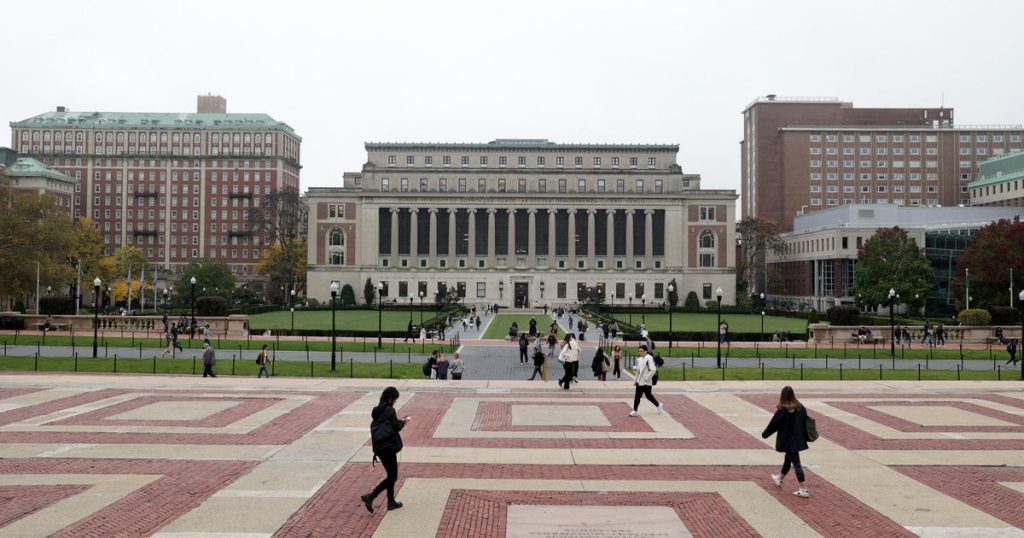Columbia University has recently implemented significant changes in response to federal demands, including a new ban on masks intended to conceal identities and the hiring of special security officers. These policies aim to align the institution with the requirements set by the federal government, which has withheld a $400 million funding grant over concerns regarding the university’s handling of antisemitism on campus. Interim President Katrina Armstrong communicated the updates to students, emphasizing the university’s commitment to providing a safe learning environment while addressing the administration’s demands effectively.
| Article Subheadings |
|---|
| 1) New Security Policies and Officer Hiring |
| 2) Adjustments to Academic and Admission Processes |
| 3) Reactions from Students and Faculty |
| 4) Federal Government’s Role in Institutional Policies |
| 5) Implications for Columbia’s Future Direction |
New Security Policies and Officer Hiring
In light of recent federal scrutiny, Columbia University has enacted a ban on face masks and coverings that obscure one’s identity. The university clarified that individuals can still wear face coverings for medical or religious reasons. In an effort to bolster campus safety, the school is also in the process of hiring 36 new special officers. These officers will have the authority to remove individuals from campus and make arrests as necessary, thus enhancing the university’s security infrastructure. The interim president’s announcement outlined that these officers are nearing completion of their training in accordance with New York state laws. Further, the university maintains its collaboration with the New York Police Department to ensure adequate safety measures are in place.
Adjustments to Academic and Admission Processes
Columbia University plans to appoint a new senior vice provost to undertake a comprehensive review of the educational programs within its Middle Eastern studies department. This initiative aims to ascertain that the university’s academic offerings are well-rounded and unbiased. In addition to this academic review, the university intends to revisit its admission processes to ensure impartiality. According to Katrina Armstrong, the institution will adopt a position of institutional neutrality to foster an environment of inclusivity and fairness in admissions.
Reactions from Students and Faculty
The measures taken by Columbia University have prompted mixed reactions among students and faculty members. Some students have expressed concern about the implications of the new policies and whether the university has compromised its longstanding principles in exchange for federal funding. Student Yousif Elhaj voiced concerns, questioning the role of the government in dictating university policy. Another student, Landon Pottebaum, described the actions as “cowardice,” reflecting a sentiment that Columbia is surrendering its essence by yielding to external pressures.
Federal Government’s Role in Institutional Policies
The federal government has made clear that compliance with their demands was a prerequisite for further discussions regarding the reinstatement of the $400 million in federal funding that Columbia has lost. The Department of Education’s stance raises questions about the relationship between federal funding and the autonomy of educational institutions. Under the current circumstances, Columbia must navigate the complexities inherent in adhering to governmental requirements while maintaining its commitment to free expression and academic independence.
Implications for Columbia’s Future Direction
The newly implemented policies signal a major shift in Columbia University’s operational structure as it endeavors to re-establish its relationship with the federal government. The changes may set a precedent for other universities in the nation facing similar challenges regarding funding and compliance with federal guidelines. As the institution moves forward, the balance between safeguarding academic integrity and fulfilling external obligations will be crucial in defining Columbia’s trajectory in the years ahead.
| No. | Key Points |
|---|---|
| 1 | Columbia University has implemented a mask ban and hired special officers to enhance campus safety. |
| 2 | A review of Middle Eastern studies and admission processes aims to ensure neutrality and diversity in education. |
| 3 | Student reactions indicate concerns regarding the balance between federal compliance and academic freedom. |
| 4 | The federal government’s involvement emphasizes the complexities surrounding funding and institutional governance. |
| 5 | Columbia University faces ongoing challenges in preserving its core values while adapting to external pressures. |
Summary
Columbia University’s recent policy changes, which include a mask ban and the hiring of special officers, reflect its attempts to address federal concerns regarding antisemitism on campus while navigating the complex relationship between institutional autonomy and government oversight. As the university implements these changes, it must remain vigilant to ensure that its foundational principles of academic freedom and inclusivity are not compromised in the quest for federal reinstatement of funding. The long-term implications of these policies will be crucial in shaping Columbia’s future and maintaining its reputation as a leading educational institution.
Frequently Asked Questions
Question: What are the new security measures at Columbia University?
Columbia University has introduced a mask ban for coverings that conceal identities, while also hiring special officers endowed with the authority to enforce campus security protocols, including making arrests if necessary.
Question: How is Columbia addressing concerns over Middle Eastern studies?
The university is appointing a senior vice provost to review its Middle Eastern studies programs to ensure they are comprehensive and unbiased, responding to calls for equitable educational offerings.
Question: What has been the student’s perspective on the new policies?
Student reactions have been mixed, with some expressing discomfort with what they perceive as a compromise of Columbia’s academic independence in exchange for federal funding.


